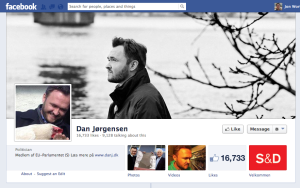
A few weeks ago in Brussels I had a cup of coffee with Roberta Metsola. Since April 2013 she has been a MEP after the resignation of Simon Busuttil. Roberta and I studied on the same Masters programme, and it was good to chat and catch up. One question she posed me sounded simple enough, but actually rather threw me when I looked into it in more depth: could I find her good examples of politicians using Facebook Pages?
So the first question is: what to include and not include? Pages like Angela Merkel, Dacian Cioloş or Johanne Schmidt-Nielsen are out, as the leading positions of these people in their respective parties or organisations, plus the additional resources that can be given to their Facebook work as a result, mean they cannot be compared to a regular MP or MEP. All three pages mentioned above are worth looking at though.
The second question then is: what is good? This means making the best use of what Facebook can offer as opposed to what other networks can offer, and not just automating content. This eliminates pages like Peter Hain’s (thanks @AlexWhiteUK for the tip) – it generates discussion, but the content is automated from Twitter. I also eliminate politicians using just personal Profiles, unless they have the Follow function enabled.
What then can Facebook offer that other networks cannot, and hence how can a politician use it? Facebook still has an extraordinary reach – it reaches users that no other social network can get to. See here for an overview of the stats. It is a place to reach voters or activists directly, rather than through intermediaries such as journalists or bloggers. The problem is that while you might be able to theoretically reach thousands of people on Facebook, chances are you will not (because getting to them is hard), and as Facebook needs to make money the main way to drive up numbers of Likes, and the numbers of people seeing your content, is to pay (details here about Likes, and here about content).
Also the type of content is important – Facebook allows combinations of text, pictures and video, and links out to external sites. This multimedia mix is better than, for example, Twitter continuing reliance on text over everything else. Conversely the amount of information that you can post on a Facebook page is lower than the amount of tweets you can send, or news you should put on a website (see here for more analysis).
So who then is actually doing it at all well? Thanks to tips from @AndreasKjeldsen, @tinamellergaard @captain_europe, and my own digging, we have a few reasonable examples. These are: Tim Farron (MP from the UK), Alyn Smith (MEP from Scotland), Dan Jørgensen (MEP from Denmark) and Morten Løkkegaard (MEP from Denmark). Thanks also to Tim Farron himself for taking the time to discuss his experience on Twitter. All of these pages have a relentless focus on the work the politician in question is doing and, particularly in the case of the two Danish MEPs, have managed to build a considerable following as a result. All these examples avoid posting too often, try to craft their messages for Facebook, and make some effort to use photos (esp Jørgensen) and video (esp Løkkegaard). In essence they all cover the main bases reasonably well.
So far this analysis is only starting to scratch the surface of good Facebook use by normal MPs or MEPs. If you have seen good examples then please do leave a comment – there must be better examples out there. While I personally remain a bit of a Facebook-politics-sceptic, the reach of Facebook remains unparalleled, so who is actually making the best use of what it can offer?
(Thanks also to @ylemai, @alessandraBXL, @IPA_thanks and @ellispalmer94 for additional help researching this piece!)
[UPDATE – 26.7.13, 1415]
New examples – French MEP Sylvie Guillaume. A little bit too much this-is-what-a-politician-does, but decent multimedia mix. Tip given on Facebook. Also Deborah Bergamini (suggested by @geekeconomist) – plenty of content, but is it really especially engaging?








Former Member of UK Parliament for Stirling Steven Paterson has a Facebook page you could look at.
It’s here:
https://www.facebook.com/StevenPatersonSNP/
As promised: some Norwegian politicians’ Facebook pages you could take a look at:
Trine Skei Grande, leader of the political party Venstre, social liberal party (small party with limited resources). https://www.facebook.com/trinesg?fref=ts
Why you should check it out: Multitude of content, is responding in the comment tread, relaxed tone.
Torbjørn Røe Isaksen, politician in the Conservative Party https://www.facebook.com/torbjornroeisaksen?fref=ts
Why you should check it out: Often funny and personal updates
Inga Marte Torkildsen, minister, SV, Socialist Left Party (small party with limited resources) https://www.facebook.com/ingamarte?fref=ts
Why you should check it out: Personal and engaging, but not ofte present in the comment section.
Minus for all the above mentioned sites: Could be reaching out more and ask for input from readers/voters. Could use videos, animations, or graphics more actively.
Arbeiderpartiet – the Labour Party https://www.facebook.com/Arbeiderpartiet?fref=ts
Why you should check it out: Interesting and effective use of animations and graphics.